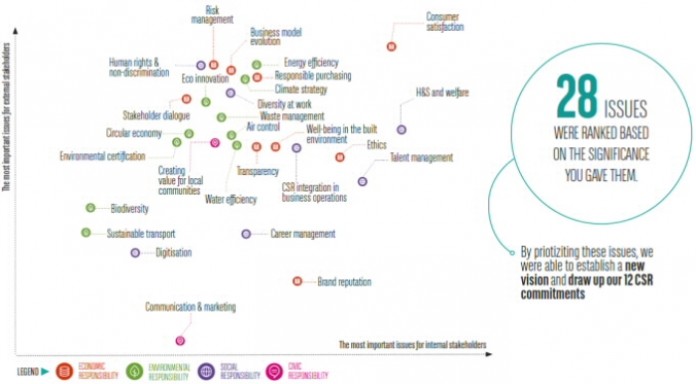
BNP Paribas Real Estate has launched its new CSR strategy, identifying 12 CSR commitments in the domain of corporate economic, environmental, social and civil responsibilities following consultation with 6,600 internal and external stakeholders across Europe.
The leading real estate adviser said it had taken the opportunity to review and update its sustainable development and CSR strategy following a number of recent global agreements in sustainable development, climate change and future national and European regulations.
The 12 new commitments are:
ECONOMIC RESPONSIBILITY
To build innovative product and service offers, along with our clients and partners, in an ethical and responsible manner:
1. Strengthening partnerships and co-working opportunities with our key stakeholders,
2. Developing a responsible and innovative service offer,
3.Guaranteeing totally transparent ethics and governance.
ENVIRONMENTAL RESPONSIBILITY
To reduce the environmental impact of our real estate activities and to make environmental quality a lever of tangible and intangible performance improvement:
4. Addressing climate change mitigation and adaptation issues in our service offers,
5. Reducing the direct and indirect environmental impact of our activities,
6. Making the environmental quality of our products and services a lever of improved performance.
SOCIAL RESPONSIBILITY
To value the development and commitment of our employees:
7. Offering a healthy, flexible and innovative work environment that enhances the well-being of our employees,
8. Promoting diversity, equal opportunities and employability of our teams,
9. Empowering our employees to develop CSR skills.
CIVIC RESPONSIBILITY
To be a committed real-estate sector player and to support local initiatives:
10. Promoting and disseminating the knowledge of CSR matters throughout the real estate sector and beyond,
11. Favouring the development of the local economy,
12. Supporting collaborative initiatives.
In February, BNP Paribas Real Estate launched a materiality analysis in order to define its new CSR strategy.
The company invited key stakeholders to respond to an online survey across 11 European countries where it is present. These comprised internal partners (employee representatives and shareholders), business partners (investors, users, local authorities, planners, suppliers and service providers), market regulators (certification bodies, regulatory authorities, professional federations and associations) and opinion leaders (the media, analysts and associations).
53% of respondents considered BNP Paribas Real Estate’s social responsibility approach to be “pioneering or engaged”, while 39% considered it to be “moderate”.
Stakeholders also ranked 28 priority issues (identified by the company) in order of importance. This ranking was then used to produce a materiality matrix (pictured above).
The BNP Paribas Real Estate CSR management is in the process of defining performance objectives and indicators that will provide a gauge of these commitments and enable a continued dialogue with stakeholders.
Catherine Papillon, Global Head of Sustainable Development/CSR at BNP Paribas Real Estate said: “CSR represents genuine performance and innovation leverage for the company. It enables us to engage differently with our clients. It also provides employees with a sense of purpose in their work, strengthens loyalty and enables us to attract new talent”.





















